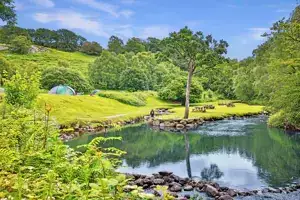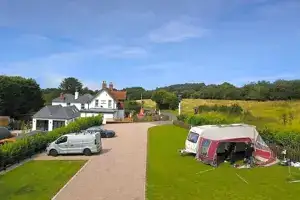To camp safely and have fun in the wild, it's crucial to understand the differences compared with packing for a camping trip to an established campsite.
In addition to the usual shelter and sleeping bags, food, cooking equipment, etc. it's also extremely important to bring a sufficient amount of water that will last until an opportunity to refill water containers from a local water source.
Other important items that your wild camping checklist should include are a first aid kit, a multi-tool, toilet paper, soap and toothpaste, a compass and map of the chosen camping area, a torch, a mobile phone in case of emergencies, water purification tablets, insect repellent, as well as sufficient clothing for the trip.
For clothing, don't forget to take something warm, as you may be more exposed and therefore get much colder in remote wild camping locations than you would at an established site.
While you'll need to be self-sufficient, it's also important to remember that you'll be carrying all of your supplies and equipment. Potentially for long periods of time and over varied terrain.
Therefore you'll need to find a balance between keeping your load as light as possible and ensuring they have all the supplies they need. You should only take what you really need or else you'll burn energy carrying unnecessary equipment and the heavy load will risk making your trip less fun.
Depending on what you value most and what you're willing to sacrifice, there are ways to reduce weight. For instance using a lightweight tarp instead of a full tent for shelter, or not bringing any food supplies that come in heavy tins but instead only packing dry foods.
Good wild camping food includes beans (now available in sachets and plastic pots, rather than heavy tins), noodles, pasta in sauce and Cup-a-Soups - all good nourishment and easy to cook. Anything that you pre-cook and reheat works well, but remember that you won't have any refrigeration available. Cereal bars and jerky make good snacks for on the move.
At a price, you can also buy food pouches from the likes of Look What We Found
At its core, wild camping is enjoying nature in a minimalistic way. Avoiding bringing all the luxuries of home may be tricky at first, but it does offer its own rewards.
You don't need to be bushcraft experts to enjoy wild camping, but brushing up on basic bushcraft skills can only be beneficial.
It is useful to know how to choose suitable water sources such as running streams or springs (preferably away from any livestock), rather than stagnant pools or puddles.
Bushcraft skills also include choosing a suitable camping location, for instance somewhere dry and as flat as possible. Some campers may want a sheltered spot but others may opt for windier locations as these areas are subject to less condensation and reduced frequency of midges.
Download our list of everything of you need to remember for the perfect camping trip!
DownloadIn the UK, you don't have to travel far to see some amazing sights.
We're lucky enough to have world-besting landscapes, history and wildlife right on our doorstep.
Where will you explore next?
Explore Destinations


